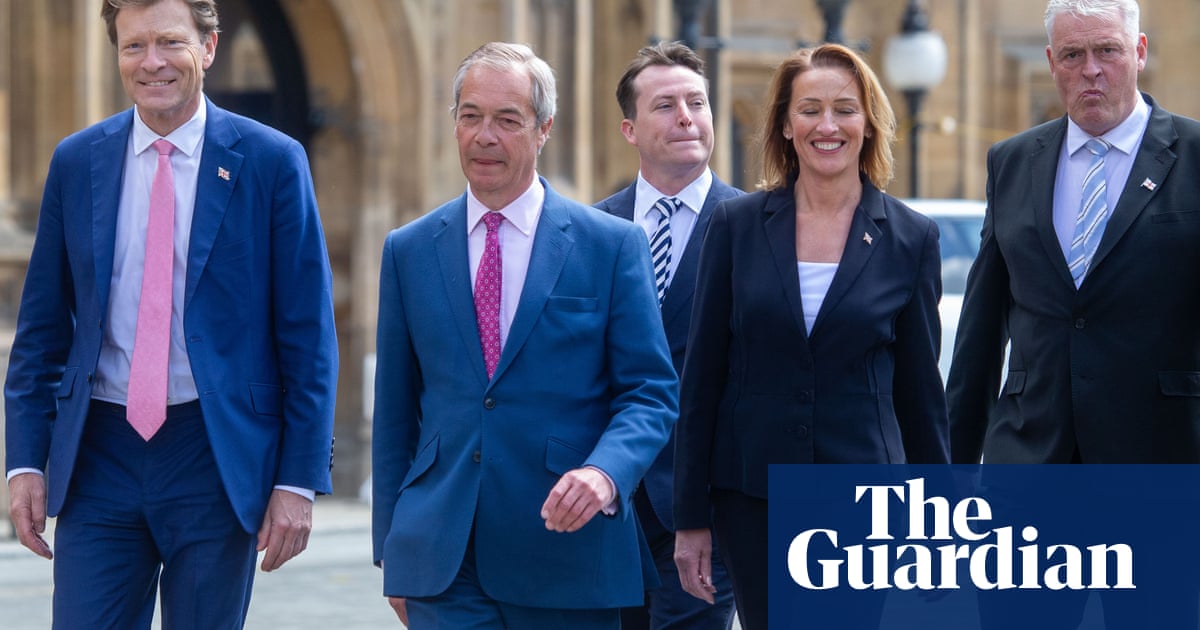WhenNigel Farageheld a victory lap of England after his mammoth local elections win on 1 May, he was characteristically bullish about Reform UK’s plan to shake up town halls.
The party would send in Elon Musk-style budget-slashing units, he said, while promising to turf out asylum seekers and any civil servants working on climate change or diversity.
Anyone who “thinks they can go on working from home,” he warned, “I think you better all be seeking alternative careers very, very quickly.”
Yet three weeks into power in nine of England’s cash-starved local authorities – where Reform UK now runs £8bn worth of public services – Farage’s “Reform-quake” has been limited to smaller but symbolic acts of the “war on woke”.
InKentand Durham, councils with a combined £1bn of debt, one of Reform’s first acts was to take down the Ukrainian flag – hoisted to show solidarity with the war-besieged nation – and vowed not to fly rainbow-coloured flags in support of LGBTQ+ residents.
The move caused silent protests in usually colourless county halls as opposition councillors draped themselves in Ukrainian blue and yellow. In Durham, the flag-lowering was branded “disrespectful and mean-spirited”, coming days before this weekend’s Pride in Armed Forces event in the city.
Darren Grimes, the former GB News presenter who is now deputy leader of Durham county council, said the move was “anti-tokenism” rather than anti-gay, describing the rainbow flag as “toxic identity politics”.
Farage’s party won a historic 677 council seats acrossEnglandthis month, dispatching Labour and Conservative councillors and winning power in areas spanning about 8.3 million people, one in seven of the country’s population.
The Guardian covered each of the first full council meetings under the new regime – spanning Lancashire, Durham, Kent, Lincolnshire,Staffordshire, Nottinghamshire, Derbyshire, and west and north Northamptonshire – in an attempt to gauge how the rhetoric matches the reality.
One of Farage’s big pledges to axe low-traffic neighbourhoods (LTNs) wasdelivered in record timealthough solely on the basis that none of the councils had any of the schemes in place. His plan to sack all diversity staff appears similarly limited, given it relates to barely a handful of roles across all Reform UK’s nine areas.
The new council leaders, many of whom have never before held political office, were pressed repeatedly on their plans to save money from coffers that have already been cut by more than £2bn since 2011 after losing a fifth of their funding under Conservative austerity measures. There were few substantive answers.
“We will get back to you once we’ve had the chance to mark your homework,” came the reply from a newly elected Staffordshire councillor when asked for detail on its agenda – a refrain repeated across England.
In several regions, Reform UK’s first cuts have been limited to excising references to the climate crisis and equality from council offices.
Joshua Roberts, a 27-year-old IT entrepreneur and newly elected Reform councillor, defended the decision to remove climate change from his new environment brief inLancashire. “It makes complete sense for the change because 80% of Lancashire is rural,” he said. “We need to protect our lovely countryside instead of these pointless endeavours which are making us all poorer – these net zero policies.”
InLincolnshire, where more than 200,000 homes are at risk of flooding, one of the party’s first moves was to abolish its council’s flood scrutiny committee, amalgamating it with a much broader environment body. Dave Throup, a former Environment Agency manager, described the move as “pretty cavalier stuff for a county with one of the highest flood risks in the country”.
Councillors voiced concerns that Reform UK will target cuts to local authorities’ spiralling special educational needs and disabilities (Send) budgets, after Farage’s claim that doctors are “massively over-diagnosing” children with some conditions.
Linden Kemkaran, the Reform leader of Kent county council, said she would put Send provision “under the microscope”. “At Reform UK we do not shy away from asking awkward questions,” she added. “If we can understand why Send diagnoses are rising exponentially every year then perhaps we can help children better.”
Some newly elected Reform members appeared already to distance themselves from Farage’s bold agenda.
Martyn Sutton, a former merchant navy officer turned Tesco worker and now Reform councillor, described his leader’s remarks as “a bit of posturing”. He admitted, though, that his party had work to do to win people over. “I worry about the people at county hall because they’re gonna think: ‘What on earth is coming?’ We’ve got to win hearts and minds.”
It will take more than warm words to win over some, however. John Shuttleworth, a long-serving independent councillor in Durham, described his new ruling party as “shocking”. “They’re the wrong people in the wrong job. They’ve got the ear of the country but they’re mainly racist white men of a certain age,” he said. “We’ll be in special measures in about six months.”
Additional reporting byMark Brown,Helen Pidd,Mimi Ibrahim,Raphael BoydandHannah Al-Othman
